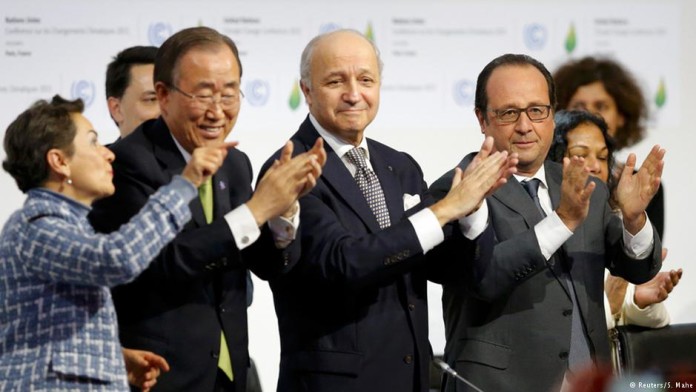What a triumph! No one was counting on that – not half a year ago, not two weeks ago, not even during the conference. Jens Thurau celebrates with delegates in Paris.
What a result! All 195 United Nations member states voted in favour of a climate treaty designed to limit rising global temperatures well below the 2 degrees Celsius (3.6 degrees Fahrenheit) target originally put forth. They voted for a treaty that makes states’ voluntary climate goals legally binding and that checks, and if need be, improves these goals should it be necessary. It is a treaty that provides financial help to poor countries on a scale that seemed unimaginable only a short time ago.
Yet everyone has also won something beyond climate protection: The Europeans, that group of states that has, and still seems to make headlines for its infighting – stood united in support of an ambitious treaty; the small island states that suffer so greatly from the effects of greenhouse gases and that have developed such a sense of self-confidence since the Rio climate conference in 1992.
It was in fact the tiny Marshall Islands that brought together a coalition of 79 countries in Paris, one joined by Brazil, Mexico and the USA. Unreal – the US is following the lead of the Marshall Islands! In the end, emerging countries India and China won as well by giving up their resistance and thus paving the way for this diplomatic sensation.
Laurent Fabius’ masterpiece
In years to come, no one name will be more synonymous with this two-week conference than that of Laurent Fabius. Just weeks after the terrible terror attacks, France’s foreign minister has kindled a light for the shocked nation. As president of the conference, Fabius led difficult negotiations with stoicism and diplomatic skill. Those who experienced the disaster of the Copenhagen conference six years ago will know just how important this extraordinary performance was. Back then, the Danish president and his team seemed to have made every mistake possible in terms of achieving a sensible balance between wealthy and poor countries. Fabius did the opposite.
And it was also a victory for the oft derided environmental groups that have been influencing the climate protection process since Rio. They have been unflinching in their tough, sometimes exaggerated criticism and unrealistic demands, but they have always pointed to the science. And then there is the United Nations that has proved that it can indeed tackle global problems.
Now the goal is to maintain the momentum of Paris: Investments must be shifted away from fossil fuels and toward renewable energy. Money promised to poor countries has to flow. This has all started, but now the process has to really take off. Perhaps, in a world of increasing crises, a new hope can come forth from environmental protection: The global community can deal with its problems together. Well done France!
Climate activists have mixed reactions to Paris agreement
While world leaders have unreservedly hailed this weekend’s historic climate pact, environmentalists have often been more cautious. For many climate experts and activists, the agreement simply does not go far enough.
The climate accord signed in Paris on Saturday has met with a varied reception from environmental organizations and climate experts.
Martin Kaiser, the Greenpeace Head of International Climate Politics, said in a statement on the organization’s US website on Sunday that the agreement failed to deal with “difficult issues like financial aid for vulnerable countries and the phasing out of coal, oil and gas.”
Kaiser says the pact avoided tricky issues involved with climate change
He also warned that the treaty could “become an empty shell,” saying that to prevent this, large emitters of greenhouse gases such as the United States, China and the European Union “must present their short and long-term commitments for the mitigation of greenhouse gases at the end of March.”
In further comments on the website of Greenpeace’s German branch, Kaiser said that the text was “strewn with the fingerprints of industrial lobbyists who are destroying our planet and its atmosphere.”
But he said that the declared goals of limiting the global rise in temperature to 1.5 degrees Celsius above that at the start of the Industrial Revolution and to reduce the emission of greenhouse gases to zero in the second half of the century would deter investors from putting their money into coal-fired plants or oil projects.
He also called on German Chancellor Angela Merkel to abandon the use of coal “to show that the hope from Paris is justified.”
Conflicting expert views
The two winners of the 2015 German Environmental Prize of the Deutsche Bundesumweltstiftung (German Environmental Foundation, DBU), climate experts Prof. Mojib Latif and Prof. Johan Rockström, have conflicting views on the Paris agreement.
In comments on the DBU’s website, Latif said the negotiators in Paris had “only agreed on the lowest common denominator.”
Latif is a noted marine researcher
Latif, who among other things is chairman of the German Climate Consortium (DKK), said that some statements in the agreement left too much leeway and were not concrete enough, and that the commitments undertaken by the various countries would not be enough to reduce global warming to much under two degrees Celsius compared with pre-Industrial Revolution levels.
Latif did, however, say that it was a success that “the international community had even recognized the dramatic nature of climate change.”
‘Ambitious agreement’
Rockström, the director of the Stockhom Resilience Centre, was more upbeat in his assessment of the Paris pact.
“It is all really ambitious and matches the science,” he said, commending the pact for giving clear guidelines on maximum levels of climate-damaging emissions such as carbon dioxide.
Rockström is an internationally recognized expert on global sustainability
Like Latif, however, he criticized the fact that the world leaders had not established more concrete goals for reducing greenhouse-gas emissions by 80 to 100 percent by 2050.
“That is the biggest gap,” Rockström said. “Otherwise it would have been an almost perfect agreement.”
‘Activism gives hope’
The chairman of BUND (Friends of the Earth Germany), Hubert Weiger, was also ambivalent in his evaluation of what had been achieved in Paris.
“The Paris agreement does not liberate the world from its dependence on coal, oil and gas. It provides no sufficient answers to the climate crisis,” he said on the BUND website.
“However, after Paris, the world now has an instrument that strengthens climate protection,” he said, saying that the 1.5-degree limit agreed upon was a positive move.
‘Huge discrepancy’
But Weiger noted a huge “discrepancy between the temperature goal set in Paris and the actual climate policies of the countries.”
Weiger places his hope in climate activists
“The agreement itself is no guarantee that global warming will be limited, but it does provide motivation to increase the tempo of climate protection,” he said, predicting that the commitment of climate activists would continue to increase.
“What gives hope is the commitment of hundreds of thousands of people across the world who are working toward a faster implementation of renewable energy sources and an end to the fossil-fuel era,” Weiger said.
-DW.COM













